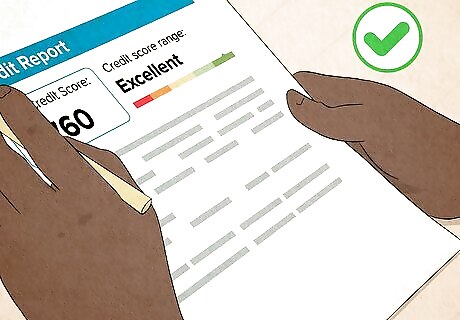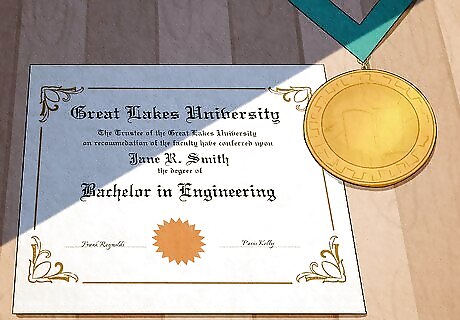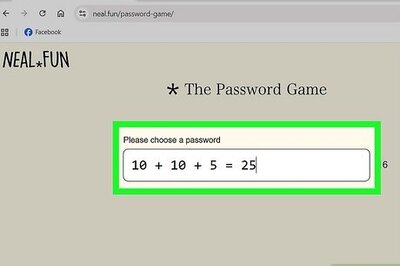
views
Meeting the Qualifications

Be in the right age range. To enlist in the Navy, you must be at least 17 but under 40 years of age. If you're 17 years old, you will need your parents permission to enlist, otherwise, you can wait until you turn 18 to self apply. To become an officer, you must be at least 19 and no older than 35. The age requirements vary according to specific positions; for example, some officer positions may require that you be older than 19 to apply.

Meet the citizenship qualifications. In order to enlist in the Navy, you must either be a US citizen or have a permanent residence visa. You may also have an Alien Registration Green Card with an established residence in the US. To become an officer, you must be a US citizen.

Have fewer than three dependents. Single parents of one child may enlist, but they must complete a special application process.

Prove that you can meet your financial obligations. While the Navy doesn't require that you be free of debt to enlist, you may be asked to prove that you're in a position to make payments on time. If you have bad credit, be able to show that you're on the path to improving it.

Pass a drug and alcohol test. The Navy has a "zero tolerance policy" for drug and alcohol abuse, and you'll be required to pass a urine test to show that your body is clear of both substances. You will also have to answer questions regarding past use or abuse of drugs and alcohol.

Meet the requirements for legal and moral standards. The Navy seeks to enlist only those with high moral character. Your traffic record, criminal record, legal record, and character history will all be subject to review before you're accepted into the Navy.

Meet the educational requirements for your desired position. Decide whether you want to be an enlisted member or an officer. This distinction determines what type of job you'll do within the Navy and how much education you're required to have. No matter what, you'll need a high school diploma or GED. To be an Enlisted member of the Navy, you don't need a college degree. You must be qualified mentally, morally, and medically. You will be given a chance to take a practice test called the EST (Enlisted Screening Test) to test your mental ability. Next you will undergo a medical exam to determine that you are physically eligible. Both of these examinations will be used to determine what specialized fields you are qualified to work in. Such areas include aviation, nuclear, electronics, medicine or other general area of work in the Navy. Most of enlisted Navy jobs are very demanding and they generally have lower salaries than officers. Enlisted members have to go through 8 weeks of boot camp (8 weeks versus 13 weeks for OCS). To be an officer, you typically must be in college and enrolled in the Naval Reserve Officer Training Program (NROTC), the Naval Academy (USNA) or have a college degree in a Navy approved area (i.e. engineering, science, math, etc.). You must also get accepted into Officer Candidate School (OCS), in addition to taking qualifying tests. Officers get saluted, get paid more, and have more benefits, including officer club privileges, officer's mess on carrier ships, better housing, and other such benefits.
Enlisting in the Navy

Contact a recruiter. Once you've determined that you meet the necessary requirements, get in touch with a recruiter, either in person or online. He or she will give you the opportunity to ask questions regarding your specific situation and interests. If you're not yet sure whether you want to join the Navy, you can still contact a recruiter, no strings attached, to ask questions. When you speak with a recruiter, be sure to ask about the commitment that will be required for the type of service you want to do. Discuss the specific requirements of your field of interest, including the education you'll need. The recruiter will provide you with an application, or direct you to one that can be found online. When you submit your application, you'll continue working with a recruiter to set up a plan for enlisting.

Decide what position you want to apply for. The Navy is rich with career options for recruits, who can choose to pursue a career in engineering, construction, education, the arts, health, information technology, special operations, and so on. Deciding early on what path you want to pursue can help you achieve your goals in the Navy more quickly. Recruits who wish to become officers who serve in managerial positions in the Navy, will need to undergo more training than recruits who will serve as enlisted sailors, the workforce of the Navy. The Navy often pays for undergraduate and graduate education to help members pursue jobs and careers.

Sign up and make a service commitment. When you're ready to commit and you've passed the necessary medical and mental exams, you'll fill out paperwork and receive instructions regarding the first year of training. If you're signing on as an enlisted sailor, you will typically commit to at least four years of service; if you're signing on for an officer position, the commitment is three to five years.
Fulfilling Your Commitment

Complete the first year of service. During the first year, you'll undergo primary training and begin learning about the job you wish you pursue. You'll spend time getting acquainted with the rules and culture of the Navy.

Complete your terms of service. As a member of the Navy, you may or may not spend time deployed on a ship. In some cases you may spend up to 6 months at a time away from your home base. At the same time, you'll work a specific job and gain expertise in your chosen field.

Rise through the ranks. Many people in the Navy are eligible for a promotion after just 9 months of active duty. As you fulfill your service commitment, opportunities for promotion and advancement are often plentiful. After 3 to 5 years of commitment, many choose to stay in the Navy past their first enlistment.















Comments
0 comment